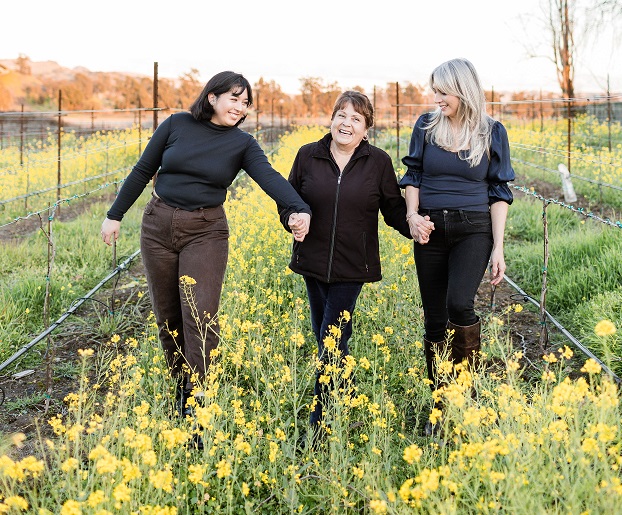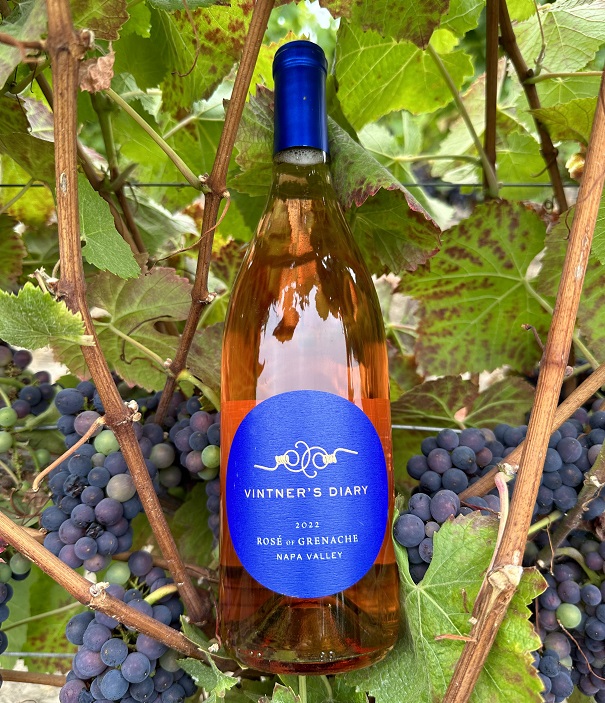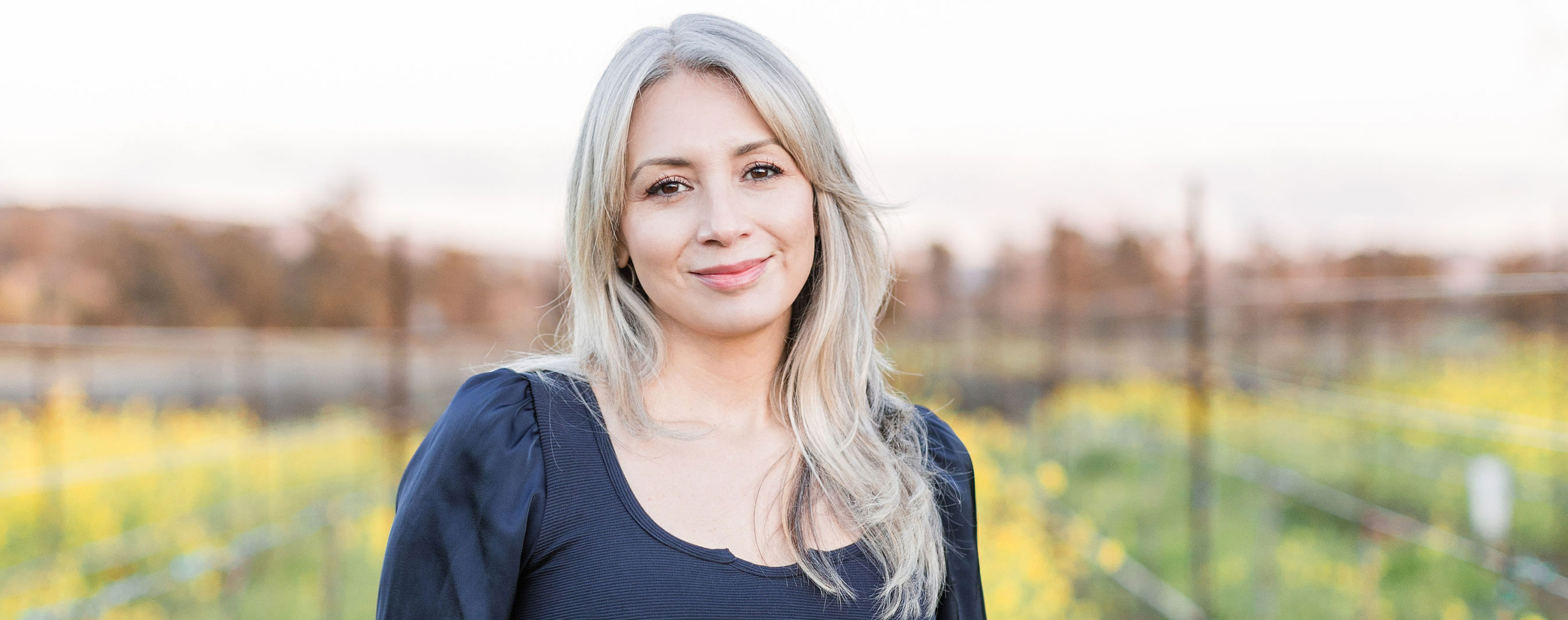Vanessa (below, right) has launched her own wine brand, Vintner’s Diary, with 150 cases of the 2022 Rosé of Grenache from Napa Valley. The $36 wine started shipping on August 7 and, according to Vanessa, sales are “going very well – we’re expecting to sell out by the end of the year”.
The name Vintner’s Diary alludes to the educational role of the brand, which has a tagline that reads: ‘Wine intimidation is common. We make it simple.’ Daughter Jocelyn Solis (below, left), an aspiring filmmaker, is producing a series of videos that will be released later this year on the Vintner’s Diary website to help make wine less intimidating. The first of these videos is scheduled for release next month.
Also in the mix is Vanessa’s mother, vineyard owner Maria de la Luz (below, centre), who is featured in the video diaries cooking her traditional Mexican dishes.

About Vintner’s Diary, Jocelyn said: “My mom has spent her career working to help other people achieve their dreams. It was time for her to chase her own dream, and I am thrilled to help.”
Vanessa was born in Sonoma and raised in Napa – one of nine children with “seven brothers and a traditional father”. She grew up in the wine business, helping in her parent’s vineyard when she was eight, and by 12 she was translating for her father in business meetings.
She says: “I was born into a multigenerational family of Mexican vineyard labourers that worked in Napa and Sonoma and built their reputation as master wine-grape grafters in the wine industry. My parents were the first in our family to save enough money to buy land in the early 1980s to plant vineyards.”
In 1997, her father felt the time was right to start a winery and he tapped Vanessa to get it up and running. She was 19 at the time. Vanessa acquired a use permit, worked her way through compliance issues, helped design the packaging, and eventually opened the first Mexican American owned tasting room established by vineyard workers in California. She developed a sales and marketing program for the Robledo Family Winery that focused on the contribution of Mexican Americans to the California wine industry, while inviting Latinos and others new to wine to learn about it in an easy to understand manner.
Vanessa also established a wine club and organised events that honoured Mexican American culture by featuring Mexican food prepared by her mother and showing how to pair that food with Robledo Family Wines. Her program and concepts were so successful that Robledo Family Winery, which started at 100 cases per year production, is now the largest Mexican American owned winery in the United States.
In October 2008 Vanessa joined Black Coyote Wines in Napa as managing partner, becoming the first Robledo to leave the family business to go it alone. She quickly boosted the Cabernet producer’s production and prestige, and increased membership in their wine club 100-fold. By 2011 Vanessa was majority owner at Black Coyote. But, when her parents split in 2015, she relinquished the position to help her mom run 45 acres of vines in two locations (Napa and Sonoma) and set up Maria de Luz Vineyards. Vanessa manages day-to-day operations of her mother’s company, negotiates and manages contracts, and sells the grapes. They have already replanted 19 acres of vineyard and are currently selling grapes to seven wineries in Sonoma, Napa, and Lake Counties.
But it hasn’t all been plain sailing. In their second year, they discovered that 11 acres of their highest value grapes in Napa were infected by red blotch and needed replanting. To help her own finances while the vineyard lay fallow for two years and didn't return to full production for seven years, Vanessa established Vanessa Robledo Wine Consulting – offering her hard-earned expertise to upcoming wineries and vineyards and advising major event coordinators on ways to reach and include Latino customers. She also helps wineries and vineyards with marketing, compliance, business management, and both bulk and bottled wine sales.
The interview

Canopy: How exciting is it to launch your own brand after 25 years in the business?
Vanessa: “I’m very excited, very happy. It’s been a lot of hard work. I think that even now it’s a little bit hard to believe fully that I’m doing it.”
Was it a big decision or was it the next obvious step?
Vanessa: “Well, I think that I’ve wanted to do it for a while, but I’ve just had so many responsibilities.
“I grew up in a very traditional Mexican American household. My parents were vineyard workers. And my grandparents were vineyard workers. My great-grandfather was a vineyard worker. To see that they dedicated their life to working in and contributing to the wine industry, through their labour in agriculture, was very significant to me growing up as a little girl in Napa. And so, of course, I knew I was going to do something in that business, but I didn’t know what role I was going to take. As I grew up in this business, I realised what my role was, which was more on the business side – which was different than my ancestors.
“My parents were the first ones to actually see the opportunity and begin to buy land and invest in land in Napa and Sonoma. And so that’s kind of where I think the passion grew. As a woman, it was different because traditionally, in our family, we were supposed to get married, we were supposed to learn how to cook and take care of our men, but not necessarily have anything for ourselves.
'I wanted something different than what my parents were saying that I had to have'“I grew up with seven brothers and a sister and all nine children are in the wine business. And so that’s kind of where my story develops into recognising that I wanted something different than what my parents were saying that I had to have. But I played a very strong and key role in their businesses. But I was supposed to play down what I did, because someday it would be my brothers’ business. And so I had to be very understanding of that, because that was our culture, that was the tradition in my family. But something within me was saying, ‘You can also have something too, but you’re gonna have to leave your family business’.
“So that’s kind of what I did, I really followed my instincts and became better at what I did. I went to Black Coyote, an ultra-premium brand. We were selling Cabernets for over $100 a bottle.
“Now I feel that, at this point in my life, everything has come together. Everything that I’ve learned in the wine business is helping me now to be able to achieve something for myself and for my daughter. So, it’s a pretty big deal to come this far.”
'It’s a pretty big deal to come this far'
How much risk have you taken developing your own project?
Vanessa: “I think I pretty much risked it all, because the last part of my career cycle I was doing fine in the brand, Black Coyote. But then my mom asked me if I will help her create a new business. And I had to make a decision to leave my comfortable spot with a luxury brand. They offered me to stay, they offered me a beautiful package. But I needed to help my mom, my mom doesn’t speak English. She was very dedicated to my father; she knows how to cook amazing food, but the business part of it she wasn’t very secure about. So when she asked me if I would help her, I had to make a decision to leave Black Coyote because I couldn’t do both.
“I was going to have to create my mom’s new business from the bottom up. Because all the businesses my parents built together were going to stay with my dad and my brothers. And so I had to say, ‘Ok, I’m gonna help my mom.’ So I did, but never did I imagine we were going to lose the vineyard the second year to red blotch. The virus manifested fairly quickly in this vineyard and we had to take it out.
“I thought that the plants were going to carry us, but the plants were saying, ‘No, we’re done, you’re gonna have to take us out’. So, that was a huge learning experience for me because I basically lost a lot of what I was building up and trying to reinvest in my mom’s business.
“We had to leave the land bare for almost two years. We got back to full production after seven years. Luckily, we had other vineyards that sustained us, but still it was very, very difficult. I gave up a lot. It’s been quite a journey and I needed all the skills that I built up to that point to survive,
“Then, once my mom’s business was settled, I felt comfortable producing Vintner’s Diary wine.”
How is the rosé going?
Vanessa: “I’ve been really happy with it. We are getting people that I haven’t met before. A lot of people initially that were supporting me were all my friends and all people that I’ve been selling wine to for years – I started in this business in 1997. When my parents started their winery is when I started learning about the business side of manufacturing and selling a product that comes from the vineyards – the crop that we produce. But I decided that the first wine that I was going to make was not going to have any of my family’s grapes. And the reason for that is because my family only grows grapes in the cooler regions, in Carneros and Sonoma Coast. And I was looking specifically for the Grenache grape.
Why is that?
Vanessa: “Because some of the best rosés in the world are produced by Grenache. It’s a well-balanced grape. And I’m a huge fan of the rosés from Provence. I always love the delicacy of their rosés; how it pairs with food – it’s very versatile. And so that’s kind of the model that I had.”
What winemaking technique did you use to get the colour of the wine?
Vanessa: “I work with a very reputable winemaker here in Napa. His name is Rudy Zuidema. He has been making rosés for many years at his main business, Shadybrook Estate Winery. He uses two different methods. He does an earlier harvest for grapes with lower sugar levels and higher acidity, and then he does a second harvest, where he uses the saignée method. He ends up blending these two together to give different characteristics in the rosé.”
Are you planning to follow this up with another wine – a white or red?
Vanessa: “I’m not sure yet. My mom has said, ‘Vanessa, you can make wine from all the grapes that I have in my vineyard’, which is Pinot and Chardonnay. So, I have a lot of opportunity, but my goal was really to make wine less intimidating.
“Our next step is creating videos to reduce the intimidation factor in wine. My daughter has a degree in TV and film, and is an editor right now for a baseball team. We’re working together doing different Mexican dishes that my mom cooks and I’m pairing with wine. It’s just to make it simpler for people to understand how to pair and why… We’re trying to allow and give permission to people to explore their own palate and not have a wine reviewer or a wine critic tell them what they need to drink, or me tell them what they need to drink. We’re just giving information so they can make their own decisions.”
Is it more intimidating for women or Latinos or is it a general intimidation from the wine industry?
Vanessa: “Since I started my career, I’ve done thousands of wine tastings, where I pour for people and/or I do tours. They’ll come to the property and ask me a bunch of questions. So, the idea of making these videos was remembering all of the questions that they’ve asked me. It’s across the board – men, women. I remember a very well educated man who came to the winery when I was probably 26 or 27, and he asked me: ‘So how do they get the peach smell in the wine?’ I had to explain to him that it’s a descriptor; it’s how some people describe the wine, but it could be that someone doesn’t smell the peach, maybe they smell a pineapple. It all depends on the senses…. What it comes down to really is that everybody’s different. And it’s about you exploring and not being intimidated by what other people say.”
Are the videos another aspect of building your brand?
Vanessa: “Yes. The videos are going to be a subscription-based business. We will put teasers out on social media, you know, Facebook, Instagram and TikTok. But the core videos will be only on our website. There, people will be able to learn about the wine from a multigenerational vintner, which is myself, my mom and my daughter. So it really gets to the core of understanding the wine industry or wine in a different way. Where it’s not intimidating, but it’s easy to understand.
“That has been a huge passion of mine, because I have noticed that not everybody feels comfortable or welcome at a winery where they’re going to be paying $100 for a wine tasting, for example. You know, people just talking about the wine and then not quite understanding all the terminology. We’ve done a few studies on what intimidates people with wine, and one of them is the terminology. The other one is price. The question is like, why is this wine more expensive? Is it better?
“Terminology and price are the two main concerns that we wanted to solve.”
Where does the name Vintner’s Diary come from?
Vanessa: “We call it a diary because it’s going to be about storytelling. Not everybody came from a lot of money in the wine industry, but that’s generally how it’s looked at: you have to start with a lot of money. We came from the ground up; we came with nothing. My parents were very poor from a village in Mexico. And they built their way up, and they taught us children to work very hard in the vineyards. I didn’t realise at the time as a little girl that working in the vineyard that hard was going to get me my secret weapon in the wine industry – to understand that 80% of the quality of wine comes from the vineyard, to understand that you have no control over the weather. Mother Nature has all the control. But how do you work with Mother Nature to produce a good quality wine? And from that, you really have to have the patience…
“I love that and I want to be able to share those things with people, so they know how special those vines are.”
What else are you doing to build the brand?
Vanessa: “Well, we’re doing it little by little. We’re working a lot in social media. It’s building slow, but we see it building so that gives me a lot of hope.”
And how is it working with your family?
Vanessa: “My daughter Jocelyn is my inspiration and the one who encouraged me to build a business for myself. She also insisted she would help me by creating the videos. She is the main reason Vintner's Diary was actualized. My mum and sister are also extremely supportive. One of my brothers, who I’m very close to, called me to congratulate me (on the launch of the rosé). But the rest of my family don’t show that much emotion.
“I feel they are proud of me. But I haven’t reached out to them. My dad’s a very old-world man who doesn’t really express himself very well, which I’ve learnt to respect. And some of my brothers are that way too.
“The people who have always been there for me are still there for me.”
So the brand really came about because your parents’ divorced and split their vineyard holding?
Vanessa: “Yes, if my parents wouldn’t have divorced I’d still be at Black Coyote because it was a good opportunity for me and by that time I had become the majority owner of the company. We just don’t know how life is going to work out.”

 English
English French
French







.png)


